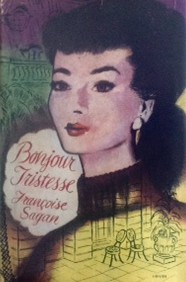Inspiring Older Readers
 posted on 29 Jul 2016
posted on 29 Jul 2016
Bonjour Tristesse by Francoise Sagan
Bonjour Tristesse - which translates as 'Hello Sadness' - is one of those books that has sat unread in my book collection for the best part of forty years. When I was at university it was a book that my women friends talked about with a sort of awe and name-dropped on a regular basis. Although I didn't know the book I knew its reputation and assumed that its fans thought that this slim volume was in some way the epitome of modern French romanticism - with a little dollop of scandal thrown in to spice it up. To my lasting shame I never got around to reading it because I'd come to think of it as something I wasn't going to like. I'm pretty sure now that this was just an assumption built on an absurd prejudice - in my mind Bonjour Tristesse was a ' young woman's' book.
Dim and lunk-headed as that was, at least I had the gumption to keep the book and when, by chance, I came across a short essay on a literary website about Francoise Sagan the other week I set about hunting my copy out and reading it for the first time.
Sagan was a precocious eighteen year old when she wrote this novelette and became an overnight sensation in France. She had taken her pen name of Sagan from her favourite author, Proust, and the title of her book from a poem by Paul Eluard - both of these facts adding to the mythology of a young woman saturated in great French literature.
The story is a simple one of a summer of lost innocence, or maybe, more accurately, lost happiness as the central character, 17 year old Cecile, who is on holiday on the Cote d'Azure with her father, finds herself embroiled in her first love affair and intervenes tragically in a love triangle involving her father.
The popularity of the book when it was published in France was driven in large part by what was then seen as a scandalous immorality in the way Cecile documents the casual insensitivity of her fathers sexual liberality and how the teenager herself behaves in a way that seems to flaunt convention.
The book was translated and published in the UK in 1955 and I can imagine it must have landed like a bomb at that time - these people, the lives they lead and the dazzling, tangible exoticism of the South of France must have been a breathless experience to readers who didn't travel and were living in an austere grey post-war Britain.
Reading it at one sitting for the first time it no longer carries that moral shock value - which is wholly to the good because it's possible to read it and marvel at the astonishing literary achievement of an eighteen year old. The writing is evocative and unfussy, the voice of Cecile utterly authentic. She is a young girl and a woman at one and the same time - she resists conformity and order but longs for the certainty of emotional stability; she wants to be seen as a person in her own right making her own decisions but is frightened to relinquish her dependency.
I loved the book but I'm not sure I would have if I'd read it when I too was young. Oddly it feels to me that It was waiting for me to be ready for it - with books as with so many things in life timing is everything.
Terry Potter
July 2016